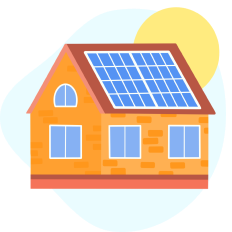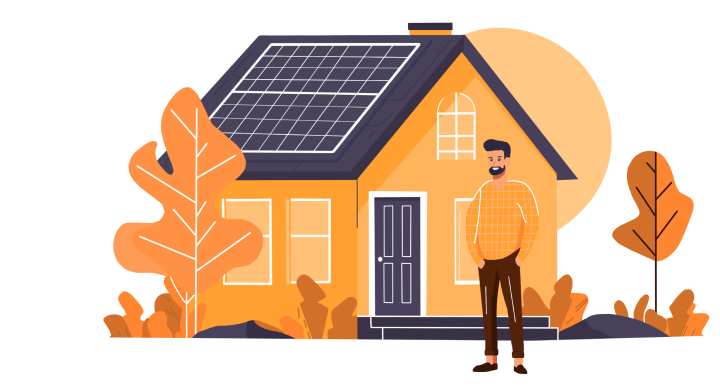Home solar installation is a great way to cut energy costs and support a sustainable future. While the process of switching might seem intimidating, planning it step-by-step makes it much simpler.
At Solar Energy Host, we can match you with top rated solar installers and we're here to guide you through everything—from evaluating your roof's solar potential and understanding energy output to selecting a reliable solar provider. With the right approach and professional advice, your home will be ready to capture the sun's energy efficiently in no time.
Step #1: Assess your home's solar potential.
Check the factors that affect solar panel efficiency in your home.
The right conditions on your rooftop, like roof orientation, angle and shading, significantly impact the efficiency of your solar panels.
Assessing these factors will also help determine the optimal placement for maximum sun exposure. Homes with minimal shading and roofs that face south (in the Northern Hemisphere) generally provide the best conditions for solar panels. Evaluating your roof's age and structural integrity is also essential to ensuring your home solar installation can be safely supported.
Consider local climate and weather patterns for optimal solar panel performance.
Solar panels perform best in sunny and clear weather conditions, so being aware of your local weather patterns ensures you maximize the performance of your solar panels.
While solar panels can still generate energy on cloudy days, the amount produced will be lower compared to sunny days. Some climates require additional solar panel maintenance, such as regular cleaning or snow removal, to maintain efficiency. You should take this into account, as it will help you plan for the real-world performance and upkeep of your solar panels.
Step #2: Choose the right solar panel system for your needs.
Before you decide to install solar power, compare the different types of grid-tied vs off-grid systems to find the best fit for your energy needs.
Before proceeding with your home solar installation, grid-tied systems are connected to the local utility grid and can send excess electricity generated by your panels back to the grid, often resulting in credits on your electricity bill.
In case of a power outage, a grid-tied system will shut down to prevent back-feeding electricity, which is a safety feature but it means you won't have power until the grid is restored. It may also provide a cost-effective way to lower your electricity bills through net metering.
Off-grid systems are not connected to the utility grid and rely entirely on solar panels and battery storage to meet your energy needs. They offer the advantage of total energy independence. Maintenance of batteries and ensuring they have adequate capacity to hold enough charge need to be considered.
Step #3: Choose the best solar provider for your home.
Connect with top local solar providers through Solar Energy Host.
Instead of searching for "solar installers near me", skip the lengthy process of individually reaching out to multiple companies. Just by entering your basic information, Solar Energy Host can connect you with reputable solar providers in your area.
By working with trustworthy local providers, you can benefit from their knowledge of regional climate conditions, relevant regulations, and available incentives.
Compare pricing and services from various providers.
Get multiple quotes from quality solar installers at once with Solar Energy Host and make the best choice for your home. Identify which companies provide the added benefits that matter most to you, such as extended warranties or maintenance packages. With access to multiple quotes to compare, you can make an informed decision without feeling pressured or rushed.
Consider financing options and government incentives to lower costs.
There are financing options, such as solar loans, leases or PPAs, that can help you go solar with minimal upfront costs. Exploring these financial avenues can make solar installations more accessible, even if the initial price seems steep.
Additionally, state and federal government incentives, tax credits, and rebates can significantly reduce your out-of-pocket expenses. Look into zero-interest loans or grant programs in your area, which can further bring down your home solar installation cost.
Frequently Asked Questions (FAQ)
What are the different types of solar panels available?
Two of the most common types of solar installations are monocrystalline and polycrystalline.
Monocrystalline panels are highly efficient and take up less space, making them ideal for homes with smaller roofs. They tend to be more expensive but deliver better performance.
Polycrystalline panels, while slightly less efficient, are more budget-friendly and still provide solid energy output, making them a good choice for those looking to save on initial costs. The best solar panels for home use for you will depend on whether you prioritize efficiency or cost savings.
Can I install solar panels myself, or should I hire a professional?
For most homeowners, investing in professional home solar installation is the safer and more reliable choice. While DIY solar panel installation is possible, if you're not familiar with electrical work or local regulations, mistakes in home solar installation could lead to safety hazards and reduced system efficiency. Plus, doing so can void the warranty of the solar panels.
Hiring a professional ensures everything is done safely and complies with local laws, potentially saving you more in the long run. Professionals also optimize the setup to ensure your system runs efficiently so you can enjoy the benefits of residential solar energy for years. They also typically provide product and power warranties.
What is the difference between on-grid and off-grid solar systems?
On-grid solar systems are connected to the local utility grid, allowing you to sell excess electricity back and reduce your energy bills. However, they don't work during power outages unless paired with a battery backup.
Off-grid systems, on the other hand, are entirely independent and require substantial battery storage to maintain power, making them ideal for those seeking full energy independence.
Save more with solar power
At Solar Energy Host, we are your trusted partner in harnessing the power of the sun. Our secure platform connects you with top local solar panel providers to ensure you get the most competitive quotes for home solar installation.
Join countless homeowners who have made the switch to renewable energy and reduced their electricity bills through solar power. See why Solar Energy Host is the go-to resource for finding a lower solar power installation price. Get a free cost estimate today!




















